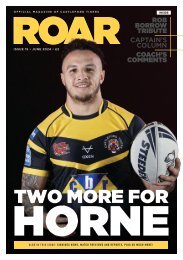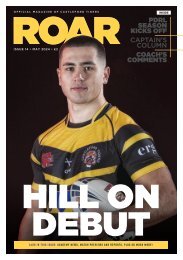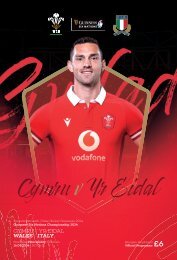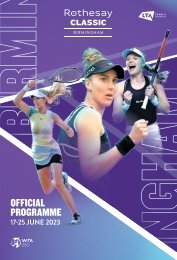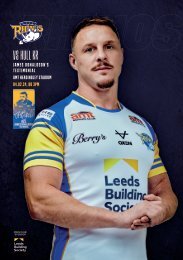Rugby League Challenge Cup Semi-Finals
Leeds Rhinos v Wigan Warriors & Salford Red Devils v Warrington Wolves Totally Wicked Stadium, St Helens Coral Challenge Cup Semi-Finals Saturday 3rd October, 2020
Leeds Rhinos v Wigan Warriors & Salford Red Devils v Warrington Wolves
Totally Wicked Stadium, St Helens
Coral Challenge Cup Semi-Finals
Saturday 3rd October, 2020
Create successful ePaper yourself
Turn your PDF publications into a flip-book with our unique Google optimized e-Paper software.
LEEDS RHINOS V<br />
WIGAN WARRIORS<br />
DAI DAVIES<br />
MIKE LATHAM RECALLS DAI DAVIES, THE ONLY MAN TO PLAY IN<br />
BOTH AN FA CUP FINAL AND CHALLENGE CUP FINAL...<br />
Playing in a <strong>Challenge</strong><br />
<strong>Cup</strong> Final remains the<br />
pinnacle of a career for<br />
most players. Playing in an<br />
FA <strong>Cup</strong> Final the same for<br />
a footballer. One man did<br />
both.<br />
Llanelli RU halfback David<br />
Davies, known as Dai, signed<br />
professional terms for Swinton in<br />
1899. He was just 18 years of age.<br />
Davies settled in quickly and in<br />
1900 the Lions embarked on a<br />
successful cup run accounting<br />
for amateurs Eastmoor before<br />
beating Holbeck, Oldham,<br />
Broughton Rangers and then<br />
Leeds Parish Church in a hardfought<br />
semi-final at Fartown.<br />
The final, staged on Saturday<br />
28 April 1900 was against old<br />
rivals Salford at the Manchester<br />
Athletics Ground at Fallowfield.<br />
After overcoming early nerves<br />
Davies enhanced his growing<br />
reputation and capped his<br />
authoritative display with the<br />
fourth and final Swinton try as<br />
the Lions won 16-8 in front of an<br />
estimated 25,000 spectators<br />
(though the official return was<br />
17,864).<br />
Two years later there was<br />
a sensation. Looking for a<br />
replacement for their goalkeeper<br />
John Sutcliffe, himself a former<br />
England RU international, who<br />
had moved to Millwall, Bolton<br />
Wanderers acted quickly and<br />
followed the precedent of signing<br />
an established rugby footballer.<br />
The Manchester Evening News<br />
reported: "Dai Davies has just<br />
signed on for Bolton Wanderers.<br />
The news will be heard with<br />
surprise by the numerous<br />
Swinton football followers. He<br />
played his first game under<br />
an assumed name and did<br />
remarkably well and as a result<br />
the Wanderers directors have<br />
offered him vastly superior terms<br />
to those obtaining at Swinton.<br />
His place in the Swinton team will<br />
prove difficult to fill and the news<br />
will be received with much regret<br />
by lovers of the <strong>Rugby</strong> code."<br />
Davies quickly adapted to the<br />
new code in the Wanderers'<br />
reserves side and was handed<br />
his first team debut on Christmas<br />
Day in the first division game<br />
against Liverpool at Anfield.<br />
He went on to play soccer for<br />
Wales at international level and<br />
established a regular place in the<br />
Wanderers team.<br />
In 1904, Wanderers embarked<br />
on an FA <strong>Cup</strong> run that developed<br />
momentum and they reached the<br />
final to play Manchester City at<br />
the Crystal Palace after victories<br />
over Reading, Southampton,<br />
Sheffield United and Derby<br />
County. Four years after playing<br />
for Swinton in the <strong>Challenge</strong> <strong>Cup</strong><br />
Final, Davies now stepped out to<br />
become the first man to double<br />
up by playing in the highlight<br />
of the association code. City<br />
were widely regarded as firm<br />
favourites, but they only won<br />
1-0, the only goal a controversial<br />
one scored by Davies' fellow<br />
Welshman Billy Meredith midway<br />
through the first half.<br />
Most observers were clear<br />
in their opinion that Meredith<br />
received the ball in an offside<br />
position as he set off on the<br />
scoring run, but the Wanderers'<br />
thechallengecup ukrugbyleague The<strong>Challenge</strong><strong>Cup</strong> thechallengecup<br />
protests were to no avail. Despite<br />
enhancing his reputation with<br />
a near faultless display and<br />
showing no sign of nerves in<br />
front of a 61,374 crowd Davies<br />
had to be content with a runnersup<br />
medal.<br />
Davies eventually returned to<br />
play for Swinton and played<br />
alongside his brother Daniel for<br />
the Lions. His return to the rugby<br />
code was warmly received by the<br />
club's supporters as he made his<br />
second debut against Wigan on<br />
Christmas Day 1909. It was like<br />
he had never been away.<br />
One critic noted: "Davies is as<br />
fit as ever and has lost none of<br />
his speed and resource which<br />
earned him the name of the<br />
Northern Union star halfback a<br />
few years ago." Appointed club<br />
captain, his Lions side reached<br />
the 1910 Lancashire <strong>Cup</strong> Final,<br />
losing 4-3 to Oldham and towards<br />
the end of that year Davies<br />
achieved another milestone<br />
when he was selected to play for<br />
Wales in an international against<br />
England at Coventry. Though<br />
Wales were heavily defeated,<br />
39-13 Davies had thus become a<br />
dual international.<br />
When the war came Davies and<br />
his brother Dan volunteered in<br />
the 16th Lancashire Fusiliers<br />
and both saw action on the Front<br />
before being hospitalised and<br />
sent home with illness. Dai died<br />
in June 1944 and is buried in<br />
Swinton Cemetery. He played 170<br />
games for Swinton, scoring 30<br />
tries and 137 first team games for<br />
Bolton Wanderers, including 14 in<br />
the FA <strong>Cup</strong>, his place in sporting<br />
history assured.<br />
23





